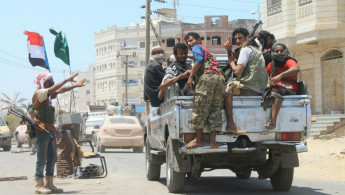Airstrikes leave many dead in Yemeni capital
At least 15 people died in the Yemeni capital Sanaa on Wednesday after Saudi-led coalition airstrikes hit a special forces command centre situated in a residential area, witnesses and medical sources said.
The headquarters are controlled by the Houthis and allied Yemeni army units loyal to former president Ali Abdullah Saleh.
Medics told AFP that the raids had inflicted “dozens” of casualties.
One medical source at Sanaa's Sabeen Hospital said that they had received “at least 15 dead and dozens wounded”, without specifying if the casualties included civilians.
The continued Saudi-led airstrikes come amid ongoing behind-closed-doors negotiations on potential UN-sponsored talks in Geneva between Yemen's warring factions.
Many of Yemen's southern factions have refused to attend, and officially Yemen's government-in-exile has also said that it will not be attending.
Of the southern leaders, former prime minister Haider al-Attas is attempting to organise a southern boycott of the Geneva conference, while the former president of South Yemen, Ali Nasser Muhammad, continues to support it.
The south is the scene of heavy fighting between Houthi-Saleh forces and local units, many of whom are secessionists fighting under the flag of South Yemen.
Dhalea, north-east of Aden, the biggest city in southern Yemen, was taken by the local units, called the Popular Resistance, Tuesday. It became the first city to be taken from the Houthi-Saleh forces since the former's advance across the country, after they dissolved the government in February.
The Geneva conference, initially scheduled for May 28, has been postponed.
“The postponement of the Geneva conference will allow Yemeni political parties to consult and be well-prepared,” a Yemeni political source in Riyadh said. “However, there is a general trend to turn it into a consultative meeting with no binding resolutions, especially after the Riyadh conference.”
The Riyadh conference was held last week in the Saudi capital, but no Houthi representatives attended. Yemeni government officials in Riyadh have now said that the Riyadh conference must be the reference point for the Geneva conference, a condition that is likely to be rejected by the Houthis and Saleh.
Separate talks are being held between Western and Houthi delegations in the Omani capital Muscat, where Iranian foreign minister Mohammad Javad Zarif visited on Tuesday to discuss the situation with Omani officials.
Iran is accused by the Yemeni government of providing arms to the Houthis, something that Iran denies.
“Iran and Oman want peace, security and stability in the region, and they both share the same stance on these matters,” Zarif said.
“We discussed ways by which we can apply a ceasefire, send humanitarian aid, and start a dialogue in Yemen,” he added. “I am deeply concerned due to the continuing airstrikes against civilians in Yemen and the resulting damage.”





 Follow the Middle East's top stories in English at The New Arab on Google News
Follow the Middle East's top stories in English at The New Arab on Google News


